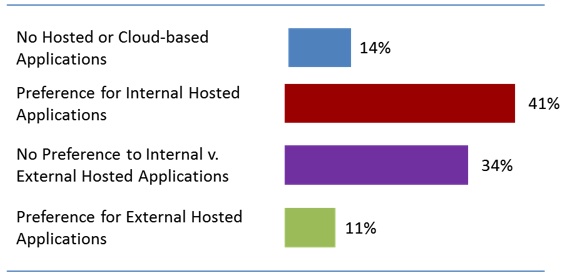
Externally Hosted Practice Management Solutions: Cloud-Based and Software-as-a-Service
The use of externally hosted systems is a hot topic in today’s business technology world. Once considered a non-starter in legal and intellectual property, there is a new-found openness to the possibility of practice management systems and data residing outside of the traditional “behind-the-firewall” infrastructure model. The change in approach has followed the broader business technology trend towards more efficient and effective use of external infrastructure available through cloud-based and SaaS systems.
To better understand the policies related to remotely hosted systems, we recently conducted a survey of corporate legal departments. We found that while 55% either require or prefer in-house deployments, 45% are either agnostic or prefer remote hosting—a significant increase from the 30% who responded similarly in 2009. Based on our client work, we see this trend towards externally hosted solutions rapidly increasing. We expect that in the next 36 months the majority of organizations will require or prefer cloud-based solutions for their practice management applications.
Fig. 1: What is your policy regarding Internal v. External Hosted Applications?

In discussing externally hosted applications, security is the most commonly cited consideration. While the issues of data security and system control are crucial, we find that these issues should no longer be an obstacle to selecting the preferred infrastructure model. Issues of proprietary control, confidentiality and protection of trade secrets – issues not unique to intellectual property – have been largely addressed with technical, legal and policy solutions.
In deciding whether a system should be managed internally or externally, often the more significant issue relates to the flexibility in building interfaces and sharing information between separate but related systems that are important for an integrated legal systems environment. Aggregating both information and processes from different systems into a unified practice management system can present technical challenges in an externally hosted infrastructure model. In the legal solutions market, while vendors have made advances, important limitations exist that can challenge certain cloud-based or SaaS solutions. We find this particularly true for larger, more sophisticated organizations that are integrating their core practice management system with document management, electronic billing, ERP and other enterprise business applications. The remote model may also be inappropriate for certain industries that require government compliance, export control or other unique electronic data control protocols. In these circumstances, in-house deployment is often the only alternative. For less complex scenarios, where an organization is deploying their IPM solution as a standalone application or with limited integration points, the remote infrastructure model is a viable and attractive alternative.
From a vendor perspective, we see an increasing move towards the external infrastructure model. The cost benefits gained from streamlined user and technical support, as well as the economies of scale in infrastructure, allow vendors to offer attractive cost benefits to their clients. While there are a few remote-only solutions, for the most part vendors continue to offer internal or external hosting as an option. Based on our discussions with vendors, we expect a continued move towards the remote or externally located solution model.


